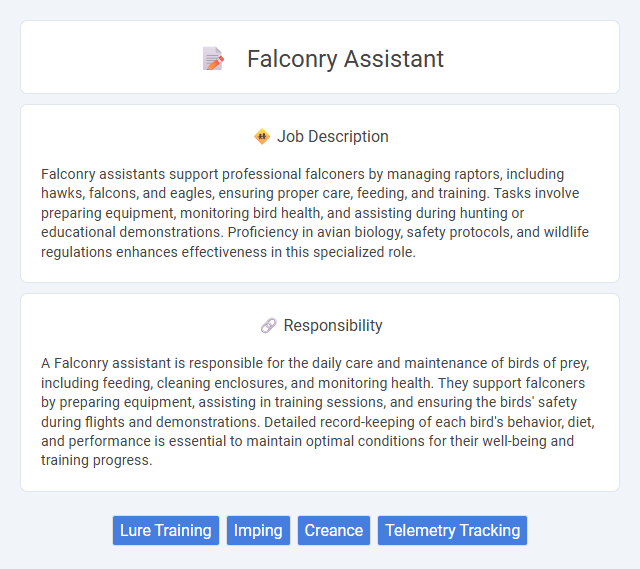
Falconry assistants support professional falconers by managing raptors, including hawks, falcons, and eagles, ensuring proper care, feeding, and training. Tasks involve preparing equipment, monitoring bird health, and assisting during hunting or educational demonstrations. Proficiency in avian biology, safety protocols, and wildlife regulations enhances effectiveness in this specialized role.
Individuals with a strong passion for animals and outdoor activities are likely to find a falconry assistant role suitable and fulfilling. Those who possess patience, attention to detail, and physical stamina may have a higher probability of excelling in the demanding tasks associated with falconry. People who prefer structured, desk-based work or have aversions to handling birds may find this job less compatible with their skills and preferences.
Qualification
A Falconry assistant must possess comprehensive knowledge of bird behavior, care, and training techniques, often demonstrated through certifications or experience in avian husbandry. Proficiency in handling birds of prey and understanding safety protocols is essential to ensure the welfare of both the falcons and handlers. Strong observational skills, physical stamina, and commitment to maintaining aviary cleanliness and equipment upkeep are key qualifications for success in this role.
Responsibility
A Falconry assistant is responsible for the daily care and maintenance of birds of prey, including feeding, cleaning enclosures, and monitoring health. They support falconers by preparing equipment, assisting in training sessions, and ensuring the birds' safety during flights and demonstrations. Detailed record-keeping of each bird's behavior, diet, and performance is essential to maintain optimal conditions for their well-being and training progress.
Benefit
A falconry assistant position likely offers the benefit of hands-on experience with birds of prey, enhancing knowledge of avian behavior and care techniques. This role probably provides opportunities for outdoor work, contributing to physical well-being and fostering a connection with nature. Engaging in this job may also boost attention to detail and patience, valuable skills transferable to various career paths.
Challenge
The Falconry assistant role likely involves managing the complex behavior and care of birds of prey, presenting unique challenges that require patience and specialized knowledge. Handling unpredictable wildlife in various environments might demand quick adaptability and problem-solving skills. Success in this position probably depends on a strong understanding of falconry techniques and a passion for animal welfare.
Career Advancement
Falconry assistant positions offer unique opportunities for career advancement in wildlife conservation and avian sciences by developing expertise in raptor behavior and care. Gaining hands-on experience with falconry birds and participating in breeding programs can lead to roles such as lead falconer or wildlife rehabilitator. Advanced training and certifications enhance prospects for careers in environmental education, research, or managing professional falconry centers.
Key Terms
Lure Training
Lure training is a critical skill for a Falconry assistant, involving the strategic use of artificial prey to condition raptors for hunting and recall. Mastery in lure training enhances bird responsiveness, ensuring effective exercise and mental stimulation while reinforcing flight commands. Falconry assistants must understand bird behavior, proper lure movement, and timing to successfully engage raptors during training sessions.
Imping
Falconry assistants specialize in the care and maintenance of birds of prey, with a key responsibility being the practice of imping to repair damaged feathers and restore flight efficiency. Expert knowledge of feather anatomy and precise techniques is essential to ensure the bird's optimal health and performance. Proficiency in imping directly impacts a raptor's ability to hunt effectively and maintain its natural behavior.
Creance
A Falconry assistant specializing in Creance plays a critical role in training birds of prey by managing the Creance line, a long tether used for controlled flight exercises and recall training. Proficiency in handling the Creance ensures safe, effective bird conditioning, enhancing the raptor's responsiveness and flight endurance. This position demands meticulous attention to the Creance's tension and bird behavior to prevent injury and promote trust between falconer and bird.
Telemetry Tracking
Falconry assistants with expertise in telemetry tracking play a crucial role in monitoring the precise location and behavior of birds of prey during training and flights. Utilizing advanced telemetry equipment, they collect real-time GPS data to ensure the safety and health of falcons while optimizing flight patterns for effective hunting exercises. Proficiency in signal interpretation and maintenance of tracking devices enhances the overall success of falconry operations and conservation efforts.
 kuljobs.com
kuljobs.com